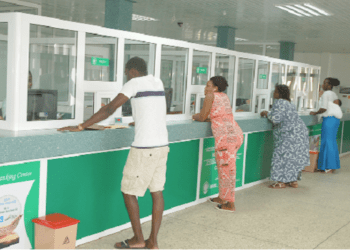Effective August 1, 2024, the Bank of Ghana (BoG) has mandated the use of the Ghana Card for all foreign currency transactions, marking a significant step toward enhancing the country’s financial system’s security and transparency.
This initiative, announced in a statement by the BoG, requires that all individuals seeking to buy or sell foreign currencies provide either a Ghana Card or a Passport (for foreign nationals) and undergo biometric verification. This policy is part of a broader effort to integrate the financial sector with the National Identification System, ensuring that all foreign currency transactions are conducted by verified individuals.
The new mandate is facilitated by a centralized foreign exchange trading platform launched by the BoG. This platform, integrated with the National Identification System, ensures that transactions are not only secure but also traceable, thereby enhancing the oversight capabilities of the BoG.
The integration with the national payment system further enables seamless electronic payments and the receipt of Ghana Cedis for foreign currency transactions at bureaux. This setup is expected to bolster the integrity of the foreign exchange market and provide a streamlined process for both consumers and businesses.
According to the BoG, all licensed Foreign Exchange Bureaux must utilize this platform for conducting their foreign currency transactions. This requirement is in line with the Bank’s commitment to ensuring the safe and sound operation of the foreign exchange business.
The platform’s introduction is also a measure to improve oversight for the directors and management of these bureaux, enhancing the BoG’s ability to monitor and supervise their operations. This is crucial for compliance with the Foreign Exchange Act, 2006 (Act 723), and the Anti-Money Laundering Act, (Act 1044), as amended, along with other relevant notices and enactments.
One of the critical components of this new system is that the trading of foreign currencies can only be conducted with BoG-licensed dealers. This includes all licensed Foreign Exchange Bureaux, ensuring that the transactions are regulated and monitored by the central bank. This regulation aims to prevent illegal or unregulated trading activities, thereby protecting the interests of both consumers and the broader economy.
Electronic Receipts for All Purchases and Sales of Foreign Currencies
Additionally, the new platform mandates that all Foreign Exchange Bureaux issue electronic receipts for all purchases and sales of foreign currencies. This electronic receipt system is not only a step towards modernizing the financial transactions but also serves as a critical tool for record-keeping and auditing purposes. It ensures transparency in the dealings of the bureaux and provides customers with a verifiable proof of their transactions.
The introduction of this centralized foreign exchange trading platform and the mandatory use of the Ghana Card for identification are part of a broader digital transformation agenda being pursued by the Bank of Ghana. By leveraging technology, the BoG aims to create a more secure and efficient financial ecosystem. This initiative is expected to curb the incidence of money laundering, fraudulent activities, and other financial crimes by ensuring that all foreign exchange transactions are traceable and conducted through verified channels.
For consumers, this new requirement means a shift towards a more regulated and secure environment for their foreign currency transactions. While it may initially require some adjustment, especially for those accustomed to the previous methods, the long-term benefits include greater security, transparency, and the assurance that their transactions are within the legal framework established by the Bank of Ghana.
By ensuring that all transactions are conducted by verified individuals through a centralized and secure platform, the BoG is not only safeguarding the integrity of the foreign exchange market but also aligning the country’s financial system with global best practices. As the new system comes into effect, it is expected to bring about a more transparent, secure, and efficient financial environment for all stakeholders involved.
READ ALSO: Eduwatch Supports District Dropout Coordinators Initiative























